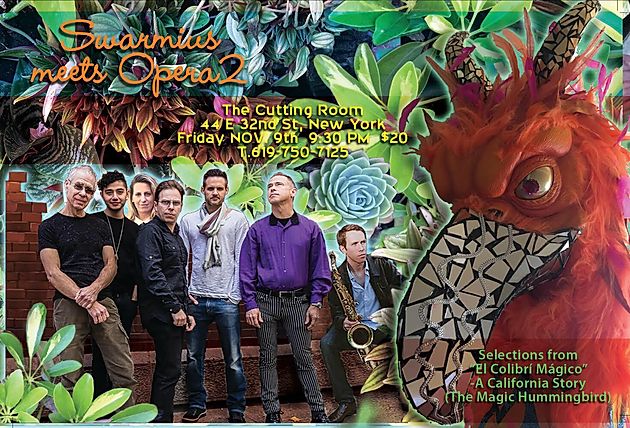Acclaimed rock/classical/electronic ensemble Swarmius brings new opera tunes to New York's Cutting Room

Swarmius, the acclaimed rock/classical/electronic music ensemble fielded by San Diego State University professor of electronic music and composition Joseph Martin Waters, will premiere nine pieces from Waters’ new opera The Magic Hummingbird (El Colibrí Mágico)--A California Story Nov. 9 at New York’s Cutting Room.
Usually a small group format conducted by Waters while stationed at his laptop, this performance will feature nine musicians, including, besides Waters, fellow Swarmius co-founder Todd Rewoldt on alto saxophone, pianist/accordionist Geoffrey Burleson (who also heads piano studies at both Princeton and New York’s Hunter College), tenor saxophonist Ian Buss, percussionist Daniel Pate, and vocalists Nina Deering (soprano), Rudy Alexander Giron (countertenor) and Charles Coleman (baritone).
“I bought a Mexican-style button accordion for Geoff, and he’s been having to learn it because I wrote a piece for it specifically--that starts out as a four-part vocal fugue and then merges into a Mexican dance!” says Waters, whose compositions are enormously complex and technically demanding, yet remarkably accessible to general audiences.
“It’s a conversation between border guards and refugees, each singing ‘Who’s gonna win?’ at each other,” he continues, “and of course the reality is that neither of them are winning anything: They’re just poor people--pawns, dispossessed, powerless.”
He adds that there are four vocal parts in the piece--but only three vocalists on stage.
“That was an interesting problem! I ended up exploring the new Japanese software that creates robotic vocalists, which in Japan has resulted in completely synthetic superstars performing as holograms at stadiums. So one of them has joined Swarmius--not the hologram, just the voice, since I don’t have enough budget to do a 3D hologram at this point, though it would be much less expensive to hire a fourth vocalist, and probably a better solution!”
Having delved into vocal music alongside his usual focus on instrumental composition, Waters notes that the vocals in his new work “are these tight three- and four-part vocals, like the Andrew sisters: They’re partly inspired by hearing my sister-in-law and nieces belt out ABBA tunes at a karaoke party last summer, and equally inspired by J.S. Bach, the Beatles--and the Andrew Sisters. It’s virtuoso singing, and two of our singers have perfect pitch--which is pretty important for my music.”
Evocative of West Side Story, The Magic Hummingbird centers on three Southern California teen rockers who end up in Tijuana when a night of clubbing takes a surreal turn and transplants them among a group of stranded Honduran refugees who are connected to ancient Mayan rituals and secrets.
“The teenagers are in a rock band called Border Patrol, and the opera starts at a pool party where the parents are out of town and the band is playing their tunes, singing about going to Tijuana to get high and be wild,” explains Waters. “They’re really nice kids—like I was in my own high school band!--just doing the typical southern California tradition of going to Tijuana to party on weekend nights.”
Once in Mexico, the American kids encounter US/Mexican border coyotes, border guards, refugees and vigilantes, both violently, and via mystical intervention from living spirits of the pre-Columbian past, transcendently.
“I wrote the libretto, and had it read by colleagues in Mexico and Columbia to get a Hispanic perspective--and rest assured that I wasn’t inaccurate or insensitive. I also brought on a Mexican collaborator as ‘cultural consultant’: People throw the term ‘cultural appropriation’ around a lot, but I think it’s part of our story, too, and the opera directly deals with the entire culture on both sides of the border in relation to trying to cross it.”
As timely as it gets, Waters researched the origins of a “situation that’s been going on for 40 years” in conceiving The Magic Hummingbird, which he began writing in June.
“I looked at the places the refugees are coming from,” he says. “How did Honduras and Guatemala get so messed up? Mostly because of our government sending in the military, supposedly to stop the spread of communism.”
This, Waters learned, begat “the dangerous journey to the U.S. border, the coyote culture on both sides of the border whereby refugees are transported across a brutal desert under cover of darkness through a clandestine network fraught with corruption. All are victims--hapless poor people stuck in miserable situations because of the machinations of billionaires. But [the opera] is all done in magical realistic settings--a Harry Potter-ish type of magic reality based on ancient Mayan mythology--which is still very much alive today in Honduras and in parts of Mexico.”
Waters notes that while he’s written tunes for his opera libretto, he’s also composed others that are “around the opera.”
“That’s what happens when I get involved in a project: My mind conjures up lots of material, some of which may end up in the opera eventually. Or, I may end up riding a trilogy of operas around this magic concept of refugees crossing borders and involving Mayan mythology.”
But he’s also thinking of releasing in entire album of the songs of Border Patrol in the manner of Frank Zappa’s 1968 doo-wop inflected Mothers of Invention concept album Cruising with Ruben & the Jets, named for the fictional Chicano band of the title.
Swarmius, featuring Rudy Alexander Giron, performing "Gratitude" at the 2018 NWEAMO Festival
Recent Posts
Archive
Tags
Related posts







